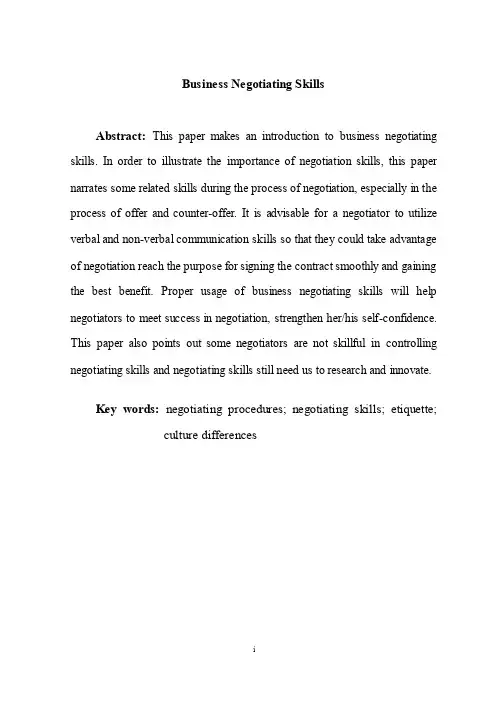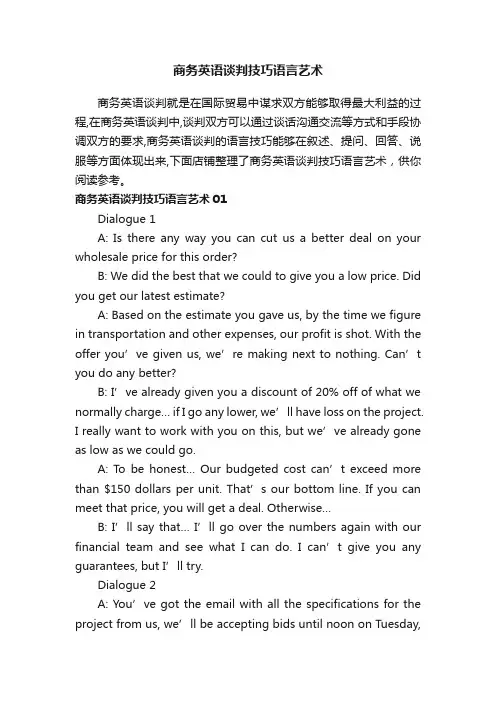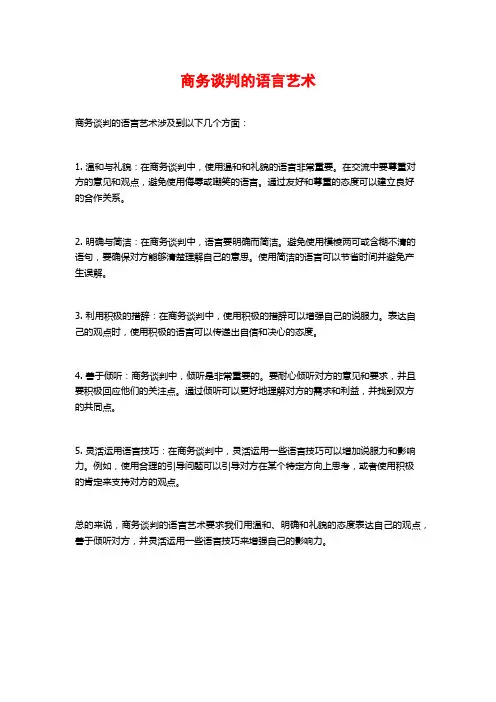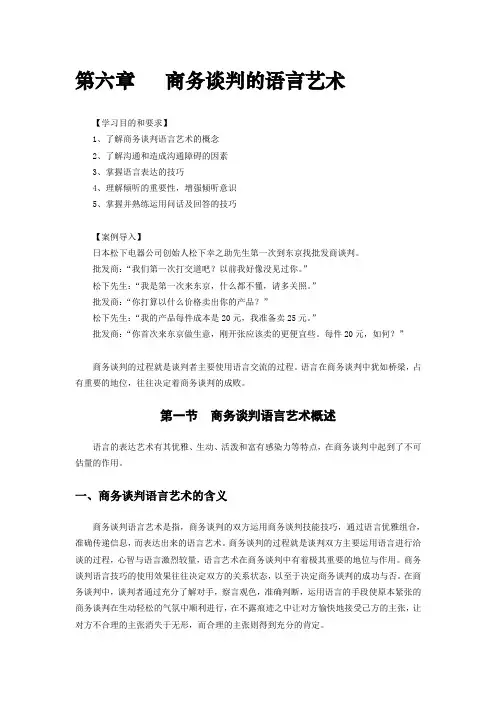Business negotition skills语言沟通的艺术
国际商务谈判中的语言艺术

国际商务谈判中的语言艺术
在国际商务谈判中,巧妙运用语言艺术可以达到“事半功倍”的效果。
以下是几个方面的技巧:
1.语言表达:在谈判中,清晰、准确、有逻辑性的语言表达对于
双方沟通、合作和达成共识至关重要。
在陈述、提问、答复和说服过程中,语言都应该简洁明了、言简意赅,使用弹性语言以给自己留有余地。
同时,注意语调、语速、停顿和重复的运用,以减少冲突和僵局的出现。
2.问题选择:提问要注意方式的选择,无论是封闭式提问还是开
放式提问,都要有利于自己一方目标的实现。
在提问时,要把握发问的时机,注意对方的反应,并且在对方提问后不要立即答复,要认真思考、准确判断后再作答复。
3.陈述技巧:陈述时,语言要简明扼要、条理清晰、语言使用准
确。
为了在谈判中给自己留有余地,一般使用弹性语言。
另
外,注意陈述语调、语速、停顿和重复的使用,尽可能减少冲突和僵局的出现。
4.诚实与信用:在谈判中,诚实和信用是重要基础。
因此,陈述
不能有欺诈的内容。
同时,在谈判中要强调对方的利益,淡化双方的分歧,以达成共识。
综上所述,国际商务谈判中的语言艺术可以通过多种技巧来实现,包括语言表达、问题选择、陈述技巧和诚实与信用等。
这些技巧可
以帮助谈判者在谈判中更有效地实现自己的目标,并促进双方的合作与共赢。
BusinessNegotiatingSkills

Business Negotiating SkillsAbstract: This paper makes an introduction to business negotiating skills. In order to illustrate the importance of negotiation skills, this paper narrates some related skills during the process of negotiation, especially in the process of offer and counter-offer. It is advisable for a negotiator to utilize verbal and non-verbal communication skills so that they could take advantage of negotiation reach the purpose for signing the contract smoothly and gaining the best benefit. Proper usage of business negotiating skills will help negotiators to meet success in negotiation, strengthen her/his self-confidence. This paper also points out some negotiators are not skillful in controlling negotiating skills and negotiating skills still need us to research and innovate.Key words: negotiating procedures; negotiating skills; etiquette;culture differences摘要:本文介绍了商务谈判过程中的一些相关技巧。
商务谈判中的语言艺术

湖北经济学院法商学院专科毕业论文(设计) 题目:商务谈判中的语言艺术专业:商务英语系(部):外语系班级:商英11302学号:***********名:**指导教师:**职称:讲师湖北经济学院法商学院教务部制目录摘要 (2)Abstract (3)引言 (4)一、语言艺术在商务谈判中的重要性 (5)(一)语言艺术能够处理谈判双方人际关系 (5)(二)准确无误地陈述谈判者的意图,表达双方各自的目的与要求 (5)(三)创造和谐的谈判氛围,融洽双方关系,从而有利于谈判的顺利进行 (5)二、商务谈判语言技巧的运用原则 (6)(一)客观性原则 (6)(二)针对性原则 (6)(三)逻辑性原则 (7)(四)灵活性原则 (7)三、商务谈判中的语言表达注意事项 (7)(一)准确、正确地运用语言 (7)(二)积极倾听,及时肯定对方 (8)(三)尊重对方、谅解对方 (8)(四)不威胁、不赌气,口头用语要避免 (8)四、商务谈判的语言运用策略 (9)(一)商务谈判中的硬语言和软语言 (9)(二)商务谈判的取胜技巧 (9)结语 (12)参考文献 .................................................................................................................... 错误!未定义书签。
致谢 (15)摘要商务谈判是指有差别的经济实体各方为了自己的经济利益和满足对方的需求,通过言语进行沟通、协商、妥协、协作的过程,把有机会的商机确定下来的活动过程。
实质上是谈判者运用言语进行协调商量,使得利益相一致的这一经过。
语言是商务谈判中的桥梁,占有重要的地位,经常性的决定了商务谈判的成功与否,所以在谈判过程中谈判者应巧妙的运用语言艺术和技巧。
本文讲述了语言艺术在商务谈判中的重要性及语言技巧的运用原则,着重分析了商务谈判中的语言表达注意事项和谈判语言的运用策略。
商务英语谈判技巧语言艺术

商务英语谈判技巧语言艺术商务英语谈判就是在国际贸易中谋求双方能够取得最大利益的过程,在商务英语谈判中,谈判双方可以通过谈话沟通交流等方式和手段协调双方的要求,商务英语谈判的语言技巧能够在叙述、提问、回答、说服等方面体现出来,下面店铺整理了商务英语谈判技巧语言艺术,供你阅读参考。
商务英语谈判技巧语言艺术01Dialogue 1A: Is there any way you can cut us a better deal on your wholesale price for this order?B: We did the best that we could to give you a low price. Did you get our latest estimate?A: Based on the estimate you gave us, by the time we figure in transportation and other expenses, our profit is shot. With the offer you’ve given us, we’re making next to nothing. Can’t you do any better?B: I’ve already given you a discount of 20% off of what we normally charge… if I go any lower, we’ll have loss on the project.I really want to work with you on this, but we’ve already gone as low as we could go.A: To be honest… Our budgeted cost can’t exceed more than $150 dollars per unit. That’s our bottom line. If you can meet that price, you will get a deal. Otherwise…B: I’ll say that… I’l l go over the numbers again with our financial team and see what I can do. I can’t give you any guarantees, but I’ll try.Dialogue 2A: You’ve got the email with all the specifications for the project from us, we’ll be accepting bids until noon on Tuesday,if you have any questions in the meantime, please let me know…B: Actually, I do have a question. We’d like to know what you had in mind for a budget on this project. We’re hoping to put together a really competitive bid, but at the same time, we’d like to hit your target price too.A: I understand, but unfortunately it is our policy not to disclose our bottom line. You can be assured that price is a weighty consideration when we review the proposals, but we also take other elements into consideration, including design and practicality. We also give weight to the reputation of the submitting company.B: Do you have any price range? Is there any way you can give me some ideas of which direction to go, or how high is too high?A: We are just looking for a reasonable price according to the specifications in our project blueprint. That’s all I can say.商务英语谈判技巧语言艺术02Using effective questioning问一些有建设性的问题问一些有建设性的问题是成功协商议题的基石。
商务谈判的语言艺术

商务谈判的语言艺术
商务谈判的语言艺术涉及到以下几个方面:
1. 温和与礼貌:在商务谈判中,使用温和和礼貌的语言非常重要。
在交流中要尊重对
方的意见和观点,避免使用侮辱或嘲笑的语言。
通过友好和尊重的态度可以建立良好
的合作关系。
2. 明确与简洁:在商务谈判中,语言要明确而简洁。
避免使用模棱两可或含糊不清的
语句,要确保对方能够清楚理解自己的意思。
使用简洁的语言可以节省时间并避免产
生误解。
3. 利用积极的措辞:在商务谈判中,使用积极的措辞可以增强自己的说服力。
表达自
己的观点时,使用积极的语言可以传递出自信和决心的态度。
4. 善于倾听:商务谈判中,倾听是非常重要的。
要耐心倾听对方的意见和要求,并且
要积极回应他们的关注点。
通过倾听可以更好地理解对方的需求和利益,并找到双方
的共同点。
5. 灵活运用语言技巧:在商务谈判中,灵活运用一些语言技巧可以增加说服力和影响力。
例如,使用合理的引导问题可以引导对方在某个特定方向上思考,或者使用积极
的肯定来支持对方的观点。
总的来说,商务谈判的语言艺术要求我们用温和、明确和礼貌的态度表达自己的观点,善于倾听对方,并灵活运用一些语言技巧来增强自己的影响力。
商务谈判的语言艺术

第六章商务谈判的语言艺术【学习目的和要求】1、了解商务谈判语言艺术的概念2、了解沟通和造成沟通障碍的因素3、掌握语言表达的技巧4、理解倾听的重要性,增强倾听意识5、掌握并熟练运用问话及回答的技巧【案例导入】日本松下电器公司创始人松下幸之助先生第一次到东京找批发商谈判。
批发商:“我们第一次打交道吧?以前我好像没见过你。
”松下先生:“我是第一次来东京,什么都不懂,请多关照。
”批发商:“你打算以什么价格卖出你的产品?”松下先生:“我的产品每件成本是20元,我准备卖25元。
”批发商:“你首次来东京做生意,刚开张应该卖的更便宜些。
每件20元,如何?”商务谈判的过程就是谈判者主要使用语言交流的过程。
语言在商务谈判中犹如桥梁,占有重要的地位,往往决定着商务谈判的成败。
第一节商务谈判语言艺术概述语言的表达艺术有其优雅、生动、活泼和富有感染力等特点,在商务谈判中起到了不可估量的作用。
一、商务谈判语言艺术的含义商务谈判语言艺术是指,商务谈判的双方运用商务谈判技能技巧,通过语言优雅组合,准确传递信息,而表达出来的语言艺术。
商务谈判的过程就是谈判双方主要运用语言进行洽谈的过程,心智与语言激烈较量,语言艺术在商务谈判中有着极其重要的地位与作用。
商务谈判语言技巧的使用效果往往决定双方的关系状态,以至于决定商务谈判的成功与否。
在商务谈判中,谈判者通过充分了解对手,察言观色,准确判断,运用语言的手段使原本紧张的商务谈判在生动轻松的气氛中顺利进行,在不露痕迹之中让对方愉快地接受己方的主张,让对方不合理的主张消失于无形,而合理的主张则得到充分的肯定。
商务谈判语言艺术集中体现在:谈判者及时捕抓对手信息,善于进行表达、提问和应答的技巧上,它具有客观性、针对性、逻辑性及论辩性的本质特征;还具有外交语言、商务法律语言、军事语言和文学语言的外在形式特征;体现着灵活而不失原则,创新而不忘规则,内容与形式并重的特点。
二、商务谈判语言艺术的重要性成功的商务谈判有赖于谈判者对语言艺术的出色运用,而出色地谈判者善于运用有说服力的语言来阐明自己的观点和意见,将自己的观点慢慢地渗透到对方的心智中去,使对方明白这些观点和意见对双方都是有益的。
第六章国际商务谈判的沟通艺术《国际商务谈判》PPT课件
(一)语言的正确使用
“谈话十原则”
(二)叙述语言要有客观性
“客观事实为依据”
(三)叙述语言要有针对性
“有的放矢”
(四)应当避免的词句
1.以我为中心的词句
2.言之无物的词句
3.没有影响的“行话”
五、国际商务谈判中说服他人的艺术
(一)说服艺术的环节
1.建立良好的人际关系,取得他人的信任 2.分析你的意见可能导致的影响 3.简化对方接受说服的程序
(二)影响“听”的因素
(三)改善“听”的建议
其他
先入为主
定式思维 方式
主观因素
二、国际商务谈判中“问”的艺术
(一)国际商务谈判中“问”的类型
“问”一般包含三个因素:问什么问题,何时发问,怎样发问。
❖ 1.强调式发问 ❖ 2.求索式发问 ❖ 3.诱导式提问 ❖ 4.封闭式提问 ❖ 5.开放式提问
❖ 6.证实式提问 ❖ 7.选择式提问 ❖ 8.借助式提问 ❖ 9.婉转式提问 ❖ 10.协商式提问
(四)提问的其他注意事项
1.掌握发问的速度
2.避免不恰当提问
(1)不应提出带有敌意的问题 (2)不应提出有关对方个人生活和工作方面的问题 (3)不要直接指责对方品质和信誉方面的问题 (4)不要为了表现自己而故意提问
3.使用条件问句
(1)互作让步 (3)寻求共同点
(2)获取信息 (4)代替“No”
(一)回答应注意的事项
1.回答前要慎重思考,不要贸然说话 2.搞清对方提问的目的,以便确定回答的策略
(二)回答的艺术
1.不确切、不正面的回答 2.利用回避的艺术 3.对于不知道的问题不要回答 4.对棘手问题可以答非所问 5.以问代答 6.有时可以采取推卸责任的方法 7.运用辩论回答问题
用英语写一篇商务谈判的语言艺术
商务谈判是商业活动中至关重要的一环,通过谈判双方可以达成利益最大化的协议。
在谈判中,语言艺术是至关重要的,它涉及到如何使用语言和交流技巧来达成双方的共赢。
下面将从相互尊重、清晰表达、主动交流、合作共赢这四个方面来详细阐述商务谈判的语言艺术。
1. 相互尊重在商务谈判中,相互尊重是非常重要的,双方应该尊重对方的地位、权威和意见。
在语言上要使用礼貌用语,避免使用侮辱性的词语或语气,不要随意打断对方的发言,表现出诚挚的尊重态度。
通过这种相互尊重的语言表达,可以建立良好的谈判氛围,增加双方信任感,为谈判的成功打下良好基础。
2. 清晰表达在商务谈判中,清晰准确的语言表达是非常重要的,双方需要明确自己的诉求和要求。
在语言表达上要避免模棱两可、含糊不清的表达方式,要简洁明了地表达自己的意见,避免产生歧义。
双方要善于倾听理解对方的表达,以及及时澄清对方的疑惑和误解,使双方在谈判中能够准确理解彼此的意图,减少交流误解,有助于达成一致意见。
3. 主动交流在商务谈判中,主动交流是非常重要的,双方需要积极主动地进行信息的交流和共享。
在语言上要善于发现问题、及时交流、主动解决,不要让问题积压和扩大,避免造成谈判的僵局。
双方要学会善于提出建设性意见和建议,及时传递重要信息,促使双方能够在谈判中更好地理解对方的诉求和期望,有助于推动谈判的顺利进行。
4. 合作共赢在商务谈判中,合作共赢是双方共同追求的目标,语言艺术也应体现在如何在语言上促进合作共赢的目标。
在语言上要善于提出合作的意向和建议,表达愿意与对方共同合作,增加双方的互信和合作的信心。
双方要在语言表达上避免出现过于强势的语气,要采取平等互利的表达方式,促成双方在谈判中能够真正实现合作共赢的商业目标。
在商务谈判中,双方在语言表达上的技巧和艺术是非常重要的,它直接影响到谈判的推进和结果。
通过恰当的语言表达和交流技巧,双方能够在商务谈判中更好地推动合作共赢的目标,达成最终的商业协议。
商务师必看的说话艺术
商务师必看的说话艺术商务师必看的说话艺术说话是一门学问,一门艺术没有人承认自己不会说话,但生活中却有实实在在不会说话的人。
作为商务师应该怎么说话,下面就和店铺一起来看看!1.急事,慢慢地说。
遇到急事,如果能沉下心思考,然后不急不躁地把事情说清楚,会给听者留下稳重、不冲动的印象,从而增加他人对你的信任度。
2.小事,幽默地说。
尤其是一些善意的提醒,用句玩笑话讲出来,就不会让听者感觉生硬,他们不但会欣然接受你的提醒,还会增强彼此的亲密感。
3.没把握的事,谨慎地说。
对那些自己没有把握的事情,如果你不说,别人会觉得你虚伪;如果你能措辞严谨地说出来,会让人感到你是个值得信任的人。
4.没发生的事,不要胡说。
人们最讨厌无事生非的人,如果你从来不随便臆测或胡说没有的事,会让人觉得你为人成熟、有修养,是个做事认真、有责任感的人。
5.做不到的事,别乱说。
俗话说“没有金刚钻,别揽瓷器活”。
不轻易承诺自己做不到的事,会让听者觉得你是一个“言必信,行必果”的人,愿意相信你。
6.伤害人的事,不能说。
不轻易用言语伤害别人,尤其在较为亲近的人之间,不说伤害人的话。
这会让他们觉得你是个善良的人,有助于维系和增进感情。
7,伤心的事,不要见人就说。
人在伤心时,都有倾诉的欲望,但如果见人就说,很容易使听者心理压力过大,对你产生怀疑和疏远。
同时,你还会给人留下不为他人着想,想把痛苦转嫁给他人的印象。
8.别人的'事,小心地说。
人与人之间都需要安全距离,不轻易评论和传播别人的事,会给人交往的安全感。
9.自己的事,听别人怎么说。
自己的事情要多听听局外人的看法,一则可以给人以谦虚的印象;二则会让人觉得你是个明事理的人。
10.尊长的事,多听少说。
年长的人往往不喜欢年轻人对自己的事发表太多的评论,如果年轻人说得过多,他们就觉得你不是一个尊敬长辈、谦虚好学的人。
11.夫妻的事,商量着说。
夫妻之间,最怕的就是遇到事情相互指责,而相互商量会产生“共情”的效果,能增强夫妻感情。
探讨商务英语会话中的艺术和技巧
探讨商务英语会话中的艺术和技巧商务英语这个概念从提出到现在,已算是家喻户晓,在当今国际化大趋势下,英语学习潮流风起云涌,在中国市场逐步深入地融入到国际经济社会之中时,国内人才市场因外资公司的蜂拥而至,对商务人才需求也越来越大。
那么,优秀的会话艺术和技巧就成为商务交际成功的敲门砖。
一、商务英语简述英语作为一种语言,通常用于日常生活交流,而随着社会、语言学的发展,商务英语作为有着其特殊用途的英语变体随经济全球化趋势应运而生,目前,以其应用性和普及性逐渐展现出其强大生命力。
二、英语在商务洽谈中的会话艺术1、与之交谈时着重注意文化背景与习惯西方凡事有预约的习惯,在安排走访活动或见面的时候尤为明显,即便是走亲访友,也会事先通过各种方式联系对方,让其有所准备,冒昧的造访,会让别人觉得唐突,这在国外是很不礼貌的。
所以,我们在对外商务交流的过程中,首先要尊重和了解谈话方的习惯,即便是临时造访,也需要和其先预约,Id like/want to make an appointment with somebody(我希望能与某人约见)。
在双方都做好准备的时候,会面才能顺利进行。
2、洽谈双方的意见和想法表示尊重每个人都希望自己发表的观点受到聆听者的注意。
当我们在商务交流时,首先要表现自己愿意倾听对方的意见和想法,适时让对方表达看法,这时可附上一句Id like/want to hear your ideas/opinions about this problem(我想听听你关于这个问题的看法)。
这样不仅让听者感觉自己是受到重视的,还能使双方因意见互换而达成共识。
在商务洽谈出现矛盾的时候,急躁的解释或搪塞是不明智的选择,要积极、冷静地听取对方的意见,使僵化的局面得以缓和,然后适时提出解决方案,这样往往会取得良好的结果。
3、事前做到未雨绸缪,杜绝临渴掘井如果谈判的核心是你,那么谈判目标就尤为重要了,你可能需要考虑协议内容包括哪些希望哪些条件对方能够答应等问题,这些谈判目标都是我们需要事前做好思想准备的,甚至还要提前考虑哪些方面我们是可以让步,哪些是不能的。
- 1、下载文档前请自行甄别文档内容的完整性,平台不提供额外的编辑、内容补充、找答案等附加服务。
- 2、"仅部分预览"的文档,不可在线预览部分如存在完整性等问题,可反馈申请退款(可完整预览的文档不适用该条件!)。
- 3、如文档侵犯您的权益,请联系客服反馈,我们会尽快为您处理(人工客服工作时间:9:00-18:30)。
Business negotiation skills语言沟通的艺术Business negotiation activities are the battlefield without smoke of powder. On the negotiation table, things are pretty changeable, which we usually called amidst the winds of change, that always causes negotiants be hard to put to cope with the situation,even though ones who are full of experience.As known, negotiation is a process of exchanging information in double ways, and the information’s sending and receiving largely depend on negotiants’ communication skills. When negotiating, language then becomes the most vital instrument of communication. Not only can we express our standpoint, acquires, opinions by using language, but also we can know better about the opponents' views, thoughts, standpoint. That is to say, language is a barrier which influences negotiation to goes smoothly or not. Due to this linguistic divide, one side may not understand the other side’s meaning and content correctly but to make the misunderstandings and divergences to break negotiation down. Thus, we need to make a choice, which language should we use.1.1the role of language communicationIn business negotiation, language expressing ability is very important,because it is powerful to convince the opponent and achieve mutualunderstanding , coordinate the interests and goals of both parties by make your expression filled with clear narration,clear arguments,sufficientevidence.The major role of language communication is to convince the opponent.During the negotiation, negotiants are uauslly locked in combat for theirown personal interests, then, which side can convince the other side totake its point and make concession, the side win the game, otherwise, itloses.Clearing the atmosphere and strengthen relationships are the other roleof language communication. Negotiation is a head-to-head meeting, itinfluences by the atmosphere from beginning to end. Atmosphere varyswith the communication between both parties. To form a harmoniousatmosphere needs both sides to work hard, however, it can be ruinedeasily by pieces of words. Hence, wise negotiants often take care of theirexpression and diction, even when they are discussing the bifurcationproblem, they never lose their temper easily and criticize opponents,naturally, those hurt-feeling words never jump out.1.2types of negotiation languageHuman language is rich, and every nation has its own language, and all trades and professions use their own language. On the basis of the speaker’s attitude, purpose and roles of the language, we can devide negotiation language into six types: Courtesy communicative language, Professional communication language, Legal language,Diplomatic language, Literary language, Military language.To the negotiator, it is necessary to learn about and study these different kinds of language.1.3 Negotiation principle1.31 Don’t Believe Everything You See and HearPart of a good salesperson’s skill is to learn to read people and situations very quickly. However, when it gets down to negotiationg, you have to take everything you see and hear with a grain of salt. Buyers are good negotiators, and thus they are good actors. You may be the only person who has what she needs, but everything she does and says, from body language to the words she uses, will be designed to lead you to believe that unless she gets an extra 10% off, she is going with the competition. Be skeptical. Be suspicious. Test, probe, and see what happens.1.3.2 don’t offer your bottom line early in the negotiationHow many times have you been asked to “give me your best price?” and have you ever given your best price only to discover that the buyer still wanted more? You have to play the game. It is expected. If you could drop your price by 10%, start out with 0%, or 2%, or 4%. Leave yourself room to negotiate some more. Who knows—you may get it for a 2% reduction. You might have to go all the way to 10%, but often you won’t. a little stubbornness pays big dividends.1.3.3 do a thorough search and reaearch for informationInformation is the lifeblood of the negotiating process. To go into a negotiation with no information is to go in blind. It is essential to begin searching for information from the very beginning, even before your initial contact with the other party.There are there primary sources of information. The first is databases. Information can be found in numerous locations such as the Internet ,newspaper and other related research sources.The second source of information is third parties who may know about or have had dealings with the people with whom you are negotiating. Friends, acquaintances and business associates may have some of the information that you need, or they may have friends who could give you that information.The third source of information is the party with whom you are negotiating and their associates. Try to develop multiple contacts within their organization and piece together bits of information from all of these contacts.While the research for information is the most intensive prior to the beginning of the negotiation, it never stops. Additional information can be gained across the bargaining table or between negotiating sessions.The search for information continues even after a negotiation is concluded, asyou implement your agreement and prepare for future negotiation.1.3.4, be patien tFinally, and most important, be patient. Sales are a high energy, fast moving business. Patience is one commodity that is in relatively short supply, but if you’re impatient in a negotiation, you will lose your shirt. If I am negotiating with you and I know that you are impatient, I will hold out just a little longer, no matter how desperate I am to make a deal with you. As long as I know you are in a hurry, I will wait. So be patient. Take the time that you need, don’t rush to give in, don’t show your anxiety, stay cool and don’t panic. Ne gotiation is a process and a game. Use the process and play the game. You will be astonished at the difference that it makes.1.3.5, don’t let emotions carry you awayNegotiation is a process that deeply invovles our ego and our emotions. We must be consciously aware of the impact of emotion on our negotiating ability. Do not let your emotion carry you away in such a manner that you undermine the entire process or sacrifice real issues in order to satisfy emotional needs.Bearing the above in mind, the chance of success in business negotiation will be more closely at hand.2. arts of language communicationNegotiation is a double—way communication. It is about communicating one party’s needs and wants to the other party while at the meanwhile being attentive to the other party’s wants and needs. Lots of times negotiations break down not because the two parties can not compromise, but because they have not adequately communicated those wants and needs to each other in a way that would bring the negotiation to a successful conclution.An effective communication is required.2.1 arts of listeningListening is one of the most important skills of a good negotiant. A common refrain from many mothers is,”You should listen more than you should speak. God gav e you two ears but just only one mouth.” And in the negotiating context, that means each side must be able to hear and make themselves understood what the other side is saying if an agreement is going to be reached.2.1.1 barriers to listeningLots of thin gs can block a person’s ability to be a good listening. According to Jason De Boer’s theory, there are four posssible barriers.The first category includes psychological barriers, which include prejudice, apathy, or fear on the part of the listener. It is important to keep an open mind when listening to the other party speak. Some negotiants will not take it seriously while listening to a woman or someone from a ethnic group. Others refuse to listen because the other party is discussing issues that are of little personal interest to them at the stage of the negotiation. Each of these paychological barrier is difficult to detect and correct, but they must be overcomeif a negotiator is to become a good lisyener.The second category involves physical barriers. These includes a disability, fatigue, or poor health. For example, if a negotiator is suffering jet lag or other travel fatigue, he may be hard to concentrate for long periods while the other party is talking. Nevertheless, these barriers are much easier to identify but require vigilance to overcome.The third one might be environmental barriers. These problems can include street traffic, heat registers or anything else that might interfere with parties hearing from each other. All these factors need to be assessed ahead of the negotiation so that no surprise occur.A last barrier could be expectation barriers, include problems brought to the negotiation even before either party begins to speak. There is an old saying, if someone is looking for trouble, they will always find it. Entering the negotiations with a positive attitude and outlook will only help listening skills.2.1.2 concentrate on listeningIn a negotiation, due to the language difference, negotiants will stick in a double language transforming situation for a long periods. As a human being, we may feel tired after long run, we may be absent—minded, then we would cause some important information missed. Concentrate on your listening. While the other party is speaking, you should not only catch all the words, but also you need to observe his/her behavior, gesture, and countenance in order to understand the information.2.1.3 listening with respectful attentionListening seriously means respecting your opponents. During your listening, you should be natual facial expression, amiable sight, and your body shoule face towards your opponents. When the other party say something, you should react to it positively, such as nod your head appropriately. In this way, both of sides can share a harmonious atmosphere, what is more, you will receive your respect in return.2.1.4 listening selectivelySometimes the negotiation can be very verbose and multifarious, which results from negotiators are talking as they still in thoughts. They do not have enough time to clear up. As a efficient listener, you need to choose and catch the points, eliminate the fault and remain the truth, then negotiation goes smoothly.2.1.5 make notesIt is a recommendable habit when the other party make its statement and you write the essential stuff down. And after that, you gain lots of material to structure your speak. The another reason is that our memory is limited, we can’y remember everything, but record can. Also making notes will focus our attention in some way.2.1.6 sumWe can do more attempts to turn into a good listener, such like rational and objective listening and something other things. Here I have to emphasize one thing that we should never ignore the decorum, always a polite motion(smile,nod) pushs the end towards the better extreme.2.2 arts of askingIn business negotiation, asking used to make clear the other party’s needs, psychology and express one’s emotions. How to make an asking can be very particular, and apply arts of asking, you will achieve many purposes.In general, an asking includes three elementts: content, time and way. To be prominent in asking questions means you are the master of negotiation.2.2.1 types of asking in business negotiationa.sealed questioningSealed questioning refers to questions which can bring special replies(yes or no) in special area. The answerer don’t need to think too much to give the answer, but times it can be threatening.b.emphatic questioningEmphatic questioning is aimed at emphasizing own views and position, such as “this agreement could not come into force until the notarization? ” or “according to your requires, could it be said that the points of my party are not clear enough?”c.heuristic questioningHeuristic questioning points at the other party’s answers and require s them to illustrate some cases to find a new way or question. In this way, asker can dig out more effective information and show the your attention no that question.d.suggestive questioningSuggestive questioning is the way to the third party’s opinion t o influence opponent’s opinion, like”how does Mr.X think about your plan?” usually it can exert strong influence on the other party, but sometimes it may drive the other party to be obnoxious. So use it cautiously.2.2.2 appropriate time to aska.intermitt ence of opponent’s speakWhen the opponent pauses his speak, catch the opportunity to ask him to win over the initiative. For example:”Just now, what did you mean?” “We will discuss some details, can you talk more about your main view?”b. till the speak is overwhen the other party is making a statement, disturbing him is impolite. But you can make use of time to think out some questions according to the statement. After the speaker finished his work, then you come up with your questions, those questions are much easier to grasp the main point and useful for understanding the intention.c.before own side gives the speakwhen it turns to your own side to speak, before your speaking, you can raise questions about the other party’s speaking, but you answer it by yourself in order to be initiative,such as “how can your speech prove anything? My understanding is……”2.2.3 gists of questioninga.prepare your questions before you askbefore the negotiation, you need to do some research about the other party. To be prepared. You need to know what kinds of question can be discussing, what kind is beyond dispute or something like that.b.control the speedusually when a negotiant speaks, he will speak in a normal speed, because if you speak too fast, the others may ca n’t follow you and think you are impatient; conversely, it would make people feel dull and think you don’t prepare enough and you don’t value the negotiation.e conditional questionClassical conditional question includes two sentential form,”what …if,” and “if…then.”There are many special advantages, such as searching the common points, interacted concessions, replacing the “NOs”, avoiding the ambiguities.d.to be sincereIt is in favour of emotional communication.2.2.4 sumAsking could never be easy. How to make asking better bothers all the negotiants. However, try more and be experienced can simplify things. You need to learn what to ask and what not, judge the weight, on the other hands, you also need to learn how to tell the facial emotion and behavioral emotion.2.3 arts of respondingWhere there is a question, there could be a answer. In business negotiation, negotiators have to take the responsibility for all what they said. In other words, their words would be regarded as a commitment. Thus, a good negotiant is the person who can do well in responding questions.Answering in negotiation means explaining about opponents’ asking, retorting the attacks, illustrating own points and the opportunity to convince opponents. So as to respond every question effectively, before the negotiation, negotiators can assume some possible issues for deliberating. You prepare more adequately, your answer gonna be better.In generally, during the negotiation, negotiators should be aimed at the other party’s quest ion and answer it positively, however, since business negotiation is variable, what lies behind a simple question may be a trap, that means answering needs techniques.2.3.1 before you answer the question, allow yourself plenty of time to havea think.As for negotiation, we can’t conclude that it is better when you immediately. Conversely, some experienced negotiators says that take the time to make an answer and do not care much more about your respond time. So after the other party puts forward with its question, you can use some formal motion such as drink some water or type your documents to prolong your prepare time, and take it easy.2.3.2 make clear about purposes of the questionsWhen negotiators come up with a question, they always insert their purposes in it. Sometimes, the asker would make the question equivocally, which drives answerer misjudge the question, to create an opportunity to obtain more benefits. As a result, before you begin to answer the question, think more and carefully, never take things for granted, and you can judge the purposes accuratelly.2.3.3 never answer once and allIn a negotiation, we actually don’t need to answer all the questions, as some questions are not worth to answering. It depends. For example, as for some boring and image—damaging question, ignoring them is the best way, but in the meanwhile ,you need to take care of your manner.2.3.4 arts of avoidanceAvoidance will be able to open up a new communication channel for some valid reasons. At times, the other party put up with a problem that you can answer it hard or you can’t answer it positively, what is more, you can’t either take refusal as your final answer, then you’d better try to avoid the problem by answering deviate to crack opponents’ offensive.2.3.5 replace answering by askin gIt’s pretty useful when you struggle to cope with a problem, then you can kick it back like a football, make the other party think over the question again. By means of deliberating the question between both sides, then the negotiation can clear out the embarrassment.2.3.6 pass the buckWhen you facing a unprepared question, you may lose your head, and you do not know what to do then. With regard to this kind problem, you can say like this,”well, for this question, although I haven’t done the research, I heard it before”, or “I have seen it on newspaper years ago, it is said…”2.3.7 sumHow to answer well is a difficult question. So many factors interfere you to determine what you should respond. Just calm down. With your ample thoughts, you have done your best already. But one more things, never answer that question which you are not familiar with, or you will be a joke.3. sumA successful negotiation results from many factors. Even though every negotiant wants to obtain more benefits through the communication, the result always is barely satisfactory. Arts of language communication may be helpful for your own side, but the most important thing is that both sides should respect each other and try their best to receive a double-wins result. Both of sides should be sincere and tell the truth and regard things from a long-term perspective.At last, I would say,”everything is negotiable,”make your use of arts of the language communication in business negotiation to reach a perfect end.。
